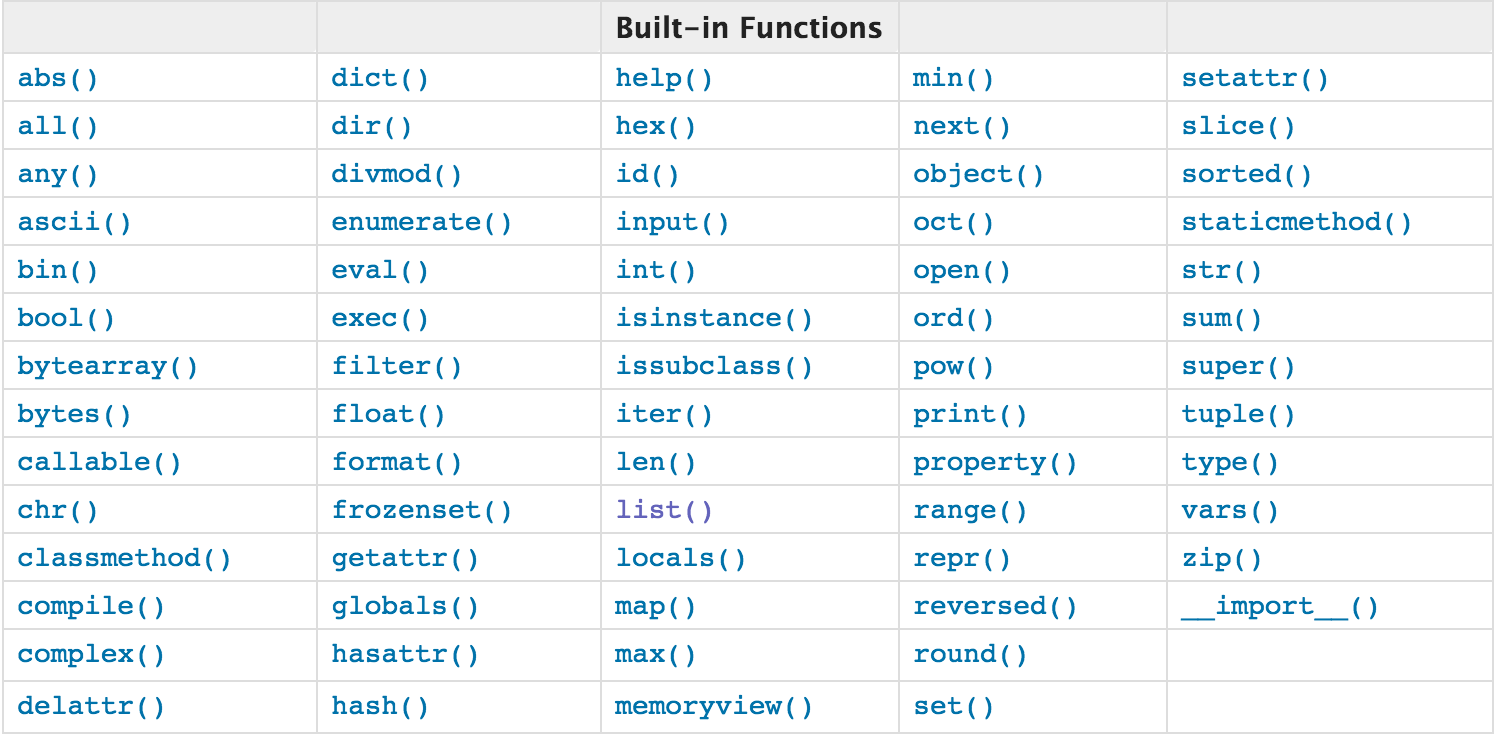一,内置函数

常用函数:
abs 取绝对值
all 所有元素皆为真 返回为真
any 有一个为真 即为真
bin 十进制转二进制
hex 十进制转十六进制
int 转为十进制
oct 十进制转八进制
bool 布尔值 判断真假
bytes 字符串转换成字节 需标注编码
chr 字母转数字
ord 数字转字母
dir 显示功能列表
help 显示具体帮助信息
enumerate 自增一列 定义起始位置
eval 执行表达式 并返回值
exec 执行代码
filter 过滤 第一个参数为函数 第二个参数为可迭代对象
map 让序列中的每一个元素做加工
open函数,i/o:
该函数用于文件处理
文件句柄 = open('文件路径', '模式')
打开文件时,需要指定文件路径和以何等方式打开文件,打开后,即可获取该文件句柄,日后通过此文件句柄对该文件操作。
打开文件的模式有:
- r ,只读模式【默认】 以只读方式打开文件。文件的指针将会放在文件的开头
- w,只写模式【不可读;不存在则创建;存在则清空内容;】
- x, 只写模式【不可读;不存在则创建,存在则报错】
- a, 追加模式【可读; 不存在则创建;存在则只追加内容;】
"+" 表示可以同时读写某个文件
- r+, 读写【可读,可写】 打开一个文件用于读写。文件指针将会放在文件的开头
- w+,写读【可读,可写】
- x+ ,写读【可读,可写】
- a+, 写读【可读,可写】
"b"表示以字节的方式操作
- rb 或 r+b 以二进制格式打开一个文件用于只读。文件指针将会放在文件的开头
- wb 或 w+b
- xb 或 w+b
- ab 或 a+b
注:以b方式打开时,读取到的内容是字节类型,写入时也需要提供字节类型

class TextIOWrapper(_TextIOBase): """ Character and line based layer over a BufferedIOBase object, buffer. encoding gives the name of the encoding that the stream will be decoded or encoded with. It defaults to locale.getpreferredencoding(False). errors determines the strictness of encoding and decoding (see help(codecs.Codec) or the documentation for codecs.register) and defaults to "strict". newline controls how line endings are handled. It can be None, '', ' ', ' ', and ' '. It works as follows: * On input, if newline is None, universal newlines mode is enabled. Lines in the input can end in ' ', ' ', or ' ', and these are translated into ' ' before being returned to the caller. If it is '', universal newline mode is enabled, but line endings are returned to the caller untranslated. If it has any of the other legal values, input lines are only terminated by the given string, and the line ending is returned to the caller untranslated. * On output, if newline is None, any ' ' characters written are translated to the system default line separator, os.linesep. If newline is '' or ' ', no translation takes place. If newline is any of the other legal values, any ' ' characters written are translated to the given string. If line_buffering is True, a call to flush is implied when a call to write contains a newline character. """ def close(self, *args, **kwargs): # real signature unknown 关闭文件 pass def fileno(self, *args, **kwargs): # real signature unknown 文件描述符 pass def flush(self, *args, **kwargs): # real signature unknown 刷新文件内部缓冲区 pass def isatty(self, *args, **kwargs): # real signature unknown 判断文件是否是同意tty设备 pass def read(self, *args, **kwargs): # real signature unknown 读取指定字节数据 pass def readable(self, *args, **kwargs): # real signature unknown 是否可读 pass def readline(self, *args, **kwargs): # real signature unknown 仅读取一行数据 pass def seek(self, *args, **kwargs): # real signature unknown 指定文件中指针位置 pass def seekable(self, *args, **kwargs): # real signature unknown 指针是否可操作 pass def tell(self, *args, **kwargs): # real signature unknown 获取指针位置 pass def truncate(self, *args, **kwargs): # real signature unknown 截断数据,仅保留指定之前数据 pass def writable(self, *args, **kwargs): # real signature unknown 是否可写 pass def write(self, *args, **kwargs): # real signature unknown 写内容 pass def __getstate__(self, *args, **kwargs): # real signature unknown pass def __init__(self, *args, **kwargs): # real signature unknown pass @staticmethod # known case of __new__ def __new__(*args, **kwargs): # real signature unknown """ Create and return a new object. See help(type) for accurate signature. """ pass def __next__(self, *args, **kwargs): # real signature unknown """ Implement next(self). """ pass def __repr__(self, *args, **kwargs): # real signature unknown """ Return repr(self). """ pass buffer = property(lambda self: object(), lambda self, v: None, lambda self: None) # default closed = property(lambda self: object(), lambda self, v: None, lambda self: None) # default encoding = property(lambda self: object(), lambda self, v: None, lambda self: None) # default errors = property(lambda self: object(), lambda self, v: None, lambda self: None) # default line_buffering = property(lambda self: object(), lambda self, v: None, lambda self: None) # default name = property(lambda self: object(), lambda self, v: None, lambda self: None) # default newlines = property(lambda self: object(), lambda self, v: None, lambda self: None) # default _CHUNK_SIZE = property(lambda self: object(), lambda self, v: None, lambda self: None) # default _finalizing = property(lambda self: object(), lambda self, v: None, lambda self: None) # default
二,匿名函数lambda表达式
- lambda只是一个表达式,函数体比def简单很多。
- lambda的主体是一个表达式,而不是一个代码块。仅仅能在lambda表达式中封装有限的逻辑进去。
- lambda函数拥有自己的命名空间,且不能访问自有参数列表之外或全局命名空间里的参数。
- 虽然lambda函数看起来只能写一行,却不等同于C或C++的内联函数,后者的目的是调用小函数时不占用栈内存从而增加运行效率
# ###################### 普通函数 ######################
# 定义函数(普通方式)
def func(arg):
return arg + 1
# 执行函数
result = func(123)
# ###################### lambda ######################
# 定义函数(lambda表达式)
my_lambda = lambda arg : arg + 1
# 执行函数
result = my_lambda(123)
对于简单的一行函数 可以使用lanbda表达式,可以叠加三元运算
